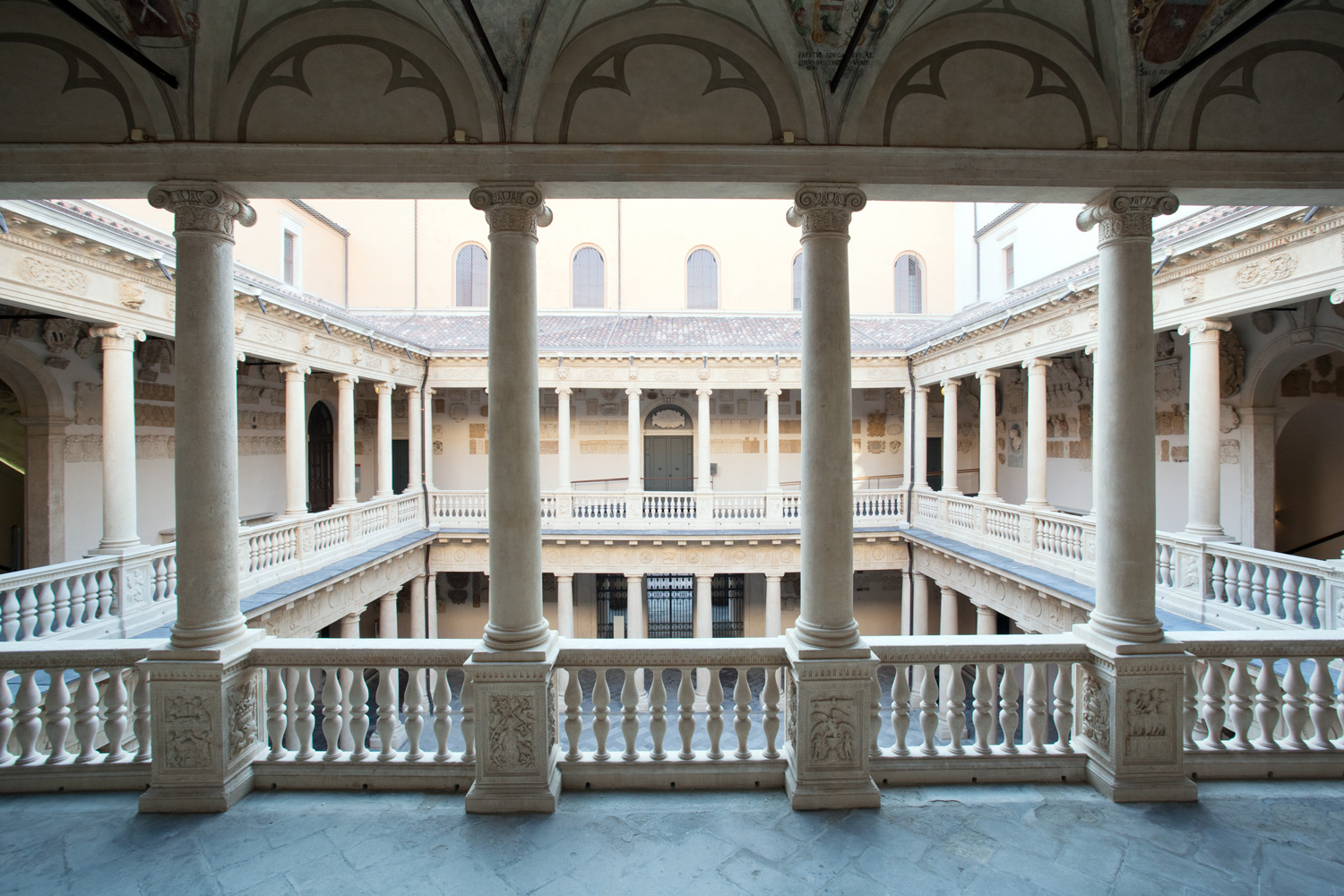Purpose and governing bodies

Established in 1982 on the initiative of the then Headmaster of the Faculty of Political Science, Prof. Antonio Papisca, under the name of ‘Centre for Studies and Training on Fundamental Rights and Freedoms’ later changed to ‘Centre for Studies and Training on the Rights of the Person and Peoples’, it was transformed, by Rectoral Decree no. 1363 of 7 June 2001, into ‘Interdepartmental Centre for Research and Services on the Rights of the Person and Peoples’, endowed with administrative autonomy.
By Rectoral Decree no. 1060 of 11 April 2013, the Interdepartmental Centre was transformed into the ‘University Centre for Human Rights’.
Upon proposal of the Governing Board of the Centre, by Rectoral Decree no. 3793 of 2 November 2017 the name of the ‘University Centre for Human Rights’ was changed to ‘University Centre for Human Rights Antonio Papisca’.
At the proposal of the Centre's Governing Board, by Rectoral Decree no. 3008 of 20 July 2022, the new administrative structure of the University Centre for Human Rights was defined.
Objectives of the Centre
The main objectives of the Centre are:
- to promote interdisciplinary research and publications in the fields of human rights and the rights of peoples, peace and human security , democracy and good governance, benefiting also from the collaboration with international institutions, such as the UN High Commissioner for Human Rights, UNESCO, the Council of Europe and the European Union;
- to promote information, education and training activities on universally recognised human rights in light of their interdependence and indivisibility;
- to foster the human rights mainstreaming within the national university and school systems;
- to contribute to the internationalisation of the University, in particular by participating in the European and international networks of university human rights centres, UNESCO Chairs and Jean Monnet Chairs;
- to provide support to the UNESCO Chair “Human Rights, Democracy and Peace” established (1999) by means of a memorandum between the university and UNESCO;
- to participate in the activities promoted by the European Inter-University Centre in Human Rights and Democratisation also as founding university of the European Master Degree Programme in Human Rights and Democratisation of the above-mentioned European Centre;
- to cooperate with ombudspersons and other regional and national human rights institutions, in particular with the Region of Veneto, as set forth in the relevant regional legislation for the promotion of the culture of human rights and peace, and with civil society organisations.
Structure and organization
Steering Council (2025-2028)
By Decree of 1 August 2025, the Magnificent Rector appointed the Governing Board of the University Centre for the three-year period 2025-2028, which is composed of Professors Gabriella Salviulo (Macroarea 1), Lucia Regolin (Macroarea 2), Paola Milani (Macroarea 3), Maria Teresa Milicia (Macroarea 3), Gianfranco Tusset (Macroarea 3), Marco Mascia (Unesco Chair Human Rights, Democracy and Peace), and Dr. Katia Milan (Technical Director).
President
By Decree of 24 September 2025, the Magnifica Rettrice, in agreement with the Governing Council, appointed Professor Marco Mascia as President of the 'Antonio Papisca' University Centre for Human Rights.
The Steering Council of the University Centre from 2022 to 2025 were Professors Gabriella Salviulo (Macroarea 1), Lucia Regolin (Macroarea 2), Paolo Gubitta (Macroarea 3), Paola Milani (Macroarea 3), Maria Teresa Milicia (Macroarea 3), Marco Mascia (Unesco Chair Human Rights, Democracy and Peace), and Dr. Katia Milan (Technical Director).
The Steering Council of the University Centre from 2019 to 2022 were Professors Gabriella Salviulo (Macroarea 1), Director, Giulia Licini (Macroarea 1), Roberto De Vogli (Macroarea 2), Giulia Albanese (Macroarea 3), Marcello Ghilardi (Macroarea 3), Paolo Gubitta (Macroarea 3), Marco Mascia (Unesco Chair Human Rights, Democracy and Peace), and Dr. Elena Autizi (Administrative Manager).
The Steering Council of the University Centre from 2016 to 2019 was composed by the following professors: Gabriella Salviulo (Macroarea 1), Roberto De Vogli (Macroarea 2), Marcello Ghilardi (Macroarea 3), Arrigo Opocher (Macroarea 3), Carlotta Sorba (Macroarea 3), Antonio Papisca (UNESCO Chair “Human rights, democracy and peace”), and by Dr. Benedetta Bixio (Administrative manager).
The Steering Council of the University Centre from 2013 to 2016 was composed by the following professors: Alessandro Pascolini (Macroarea 1), Alessio Vieno (Macroarea 2), Arrigo Opocher (Macroarea 3), Vincenzo Pace (Macroarea 3), Carlotta Sorba (Macroarea 3), Antonio Papisca (UNESCO Chair “Human rights, democracy and peace”), and by Dr. Cinzia Clemente (Administrative manager).
From 2001 to 2013, the Technical-Scientific Committee of the Interdepartmental Centre on human rights and the rights of peoples has included the following Professors of the University of Padova: Achille Agnati (Faculty of Political Science), Paolo Benciolini (Faculty of Medicine), Paolo Faggi (Faculty of Education Science), Marco Mascia (Director), Nino Olivetti Rason (Faculty of Political Science), Vincenzo Pace (Faculty of Political Science), Bruno Paccagnella (Faculty of Medicine), Antonio Papisca (Faculty of Political Science), Aldo Rossi (Faculty of Engineering), Raffaella Semeraro (Faculty of Education Science), Remo Naccarato (From 2001-2005, Faculty of Medicine).
From 1982 to 2001 the following have participated in the Scientific and Technical Committee of the Study and Training Centre on the Rights of the Person and of the Peoples: Carlo Tullio Altan, Professor of Cultural Anthropology at the University of Trieste; Achille Ardigò, Professor of Organizational Sociology at the University of Bologna; Dom Helder Camara, Archbishop Emeritus of Recife and Olinda, Brazil; Marcello Cresti, Professor of General Physics at the University of Padua; Héctor Gros Espiell, Professor of International Law at the University of Montevideo, Minister of the Foreign Affairs of Uruguay; Antonio Lepschy, Professor of Automatic Controls at the University of Padova; Luigi Mascia, Regional Secretary of the culture, education and the training activities of the Region of Veneto; Adolfo Perez Esquivel, Nobel Prize for Peace; Fausto Pocar, Professor of International Relations at the University of Milan, President of the Human Rights Committee of the United Nations; Francois Rigaux, Professor Emeritus of International Law at the University of Leuven, President of the Permanent People's Tribunal; Giorgio Spini, Professor of European History at the University of Florence; Aldo Visalberghi, Professor of Pedagogy at the University of Rome.

